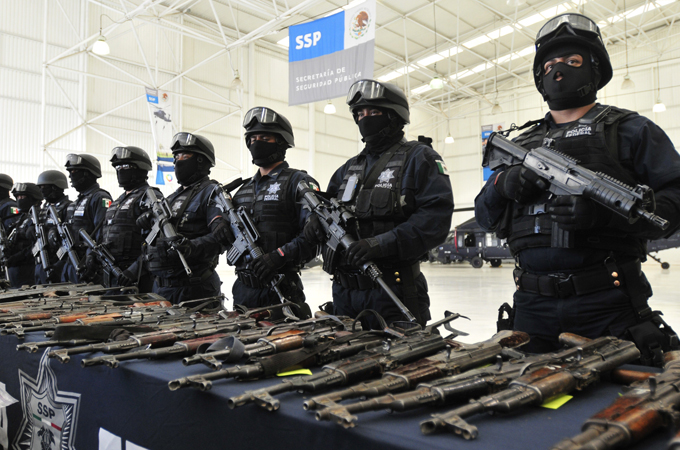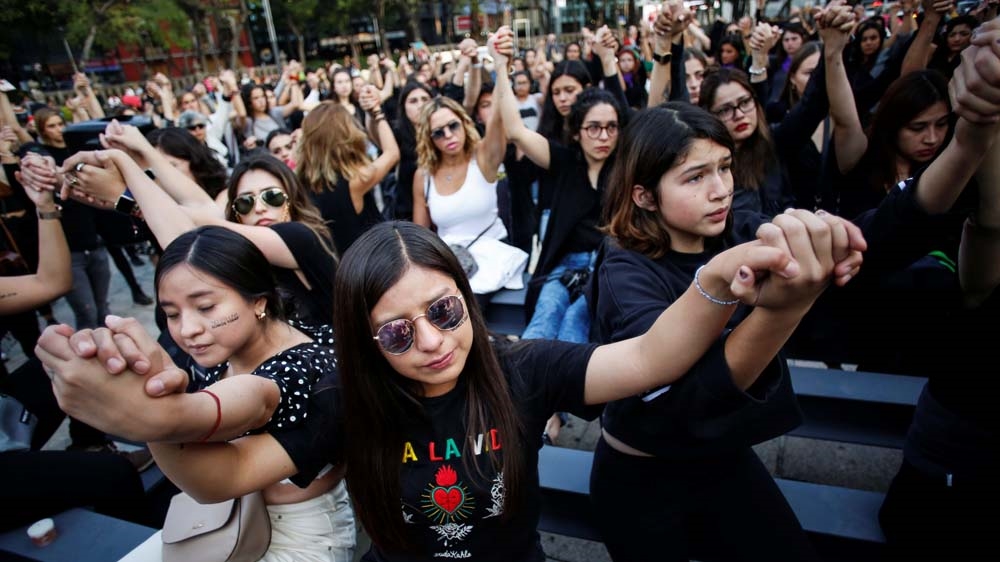
Mexico City, Mexico – As a spate of gun violence, including the elementary school mass killing in Uvalde, Texas, continues to unfold in the United States, the Mexican government has not missed the opportunity to talk up the historic lawsuit it brought one year ago in the Massachusetts District Court against 10 US gun manufacturers and distributors.
The lawsuit, Mexico vs Smith & Wesson et al, seeks damages from the companies for negligence leading to Mexico’s shocking rate of gun homicides and other gun violence, which is largely attributable to guns sold in the US and trafficked over the border. The government estimates the damage to be approximately $10bn.
A substantial claim in Mexico’s complaint is that the Protection of Lawful Commerce in Arms Act (PLCAA), which prevents US gun companies from being sued, does not apply in Mexico.
“Crucially, Mexico attacks PLCCA in its lawsuit, claiming it does not give immunity to the defendants [to Smith & Wesson et al]”, León Castellanos-Jankiewicz, a Mexican international human rights law scholar and observer of the Mexico lawsuit, told Al Jazeera.
Shortly after the Uvalde shooting, Foreign Minister Marcelo Ebrard said it demonstrated “clear negligence on the part” of the gun industry in the US, as yet another case in which “a young man [can be] sold an assault weapon at the age of 18.”
In his comments, Ebrard linked the Uvalde tragedy to Mexico’s lawsuit, which currently awaits a judicial decision on a request by the gun companies to dismiss it, on the basis of PLCAA.
At a recent news conference in Mexico Ebrard also said that, just as the US issues travel alerts for Mexico on account of violence, Mexico will “create arms trafficking alerts” for travel to the US. According to the national daily El Financiero, the Minister said that lowering the number of weapons in “both countries” was a joint effort, saying he believed US President Biden supported greater arms control.
To be sure, the US House of Representatives recently passed a Biden-backed bill to ban assault weapons that is currently awaiting Senate debate.
New scrutiny
In January this year, the nations of Belize and Antigua and Barbuda filed a supporting brief with the Massachusetts court in support of the Mexico complaint, along with the non-government organisation the Latin American and Caribbean Network for Human Security. Their brief argued that the flow of guns across the US-Mexico border also increases deadly violence throughout Latin America and the Caribbean.

The attorneys-general of 14 US states and 26 districts also filed their support.
US legislators are also attempting to place pressure on gun companies through other means.
The states of California, Delaware, and New York have recently enacted laws allowing litigation against gun companies to proceed despite the PLCAA. New Jersey is contemplating a similar statute.
A bill developed by federal Congressman Adam Schiff, from California, also recently proceeded to the House of Representatives. If passed, the Equal Access to Justice for Victims of Gun Violence Bill would repeal the PLCAA.
Castellanos-Jankiewicz, who is a researcher at the Asser Institute in The Hague, notes that the PLCAA “should be repealed because it hinders the right of gun victims to access the courts in accordance with international human rights law.”
“Crucially, Mexico’s lawsuit convincingly argues that PLCAA is inoperative in certain transborder situations. To avoid this exposure, the case could lead the gun industry to adopt litigation-induced safety enhancements.”
Mexico’s lawsuit is also supported by US-based victims’ groups including March for Our Lives, the group founded by survivors of the 2018 Parkland shooting when a gunman fired open at a high school there, killing at least 17 people.
Company value at risk?
Earnings reports for the two publicly listed companies in the lawsuit, Smith & Wesson and Sturm, Ruger & Company (Ruger) mention the lawsuit.
Smith & Wesson’s second-quarter report to the US Securities and Exchange Commission noted that, along with other litigation the company has faced and continues to face (including from victims of the 2019 California synagogue shooting), they intended to “aggressively” defend itself against Mexico lawsuits. “Litigation of this nature also is expensive, time-consuming, and diverts the time and attention of our management,” it added.
For Ruger, while it “is unlikely that litigation, including punitive damage claims, will have a material adverse effect on the financial position of the Company,” it “may have a material impact on the Company’s financial results for a particular period.”

Gun stocks and business risk
Further pressure is being placed on the companies through shareholder activism focused on the business risks of continuing gun violence.
Last month Ruger shareholders approved a proposal put forward by members of the Interfaith Center on Corporate Accountability [who have become shareholders of the company in order to influence it on gun safety matters] to have the company undertake a Human Rights Impact Assessment.
Alejandro Celorio Alcántara is the Mexican foreign affairs department’s principal legal adviser, leading the case against the gun companies.
The career diplomat told Al Jazeera that the team that prepared the lawsuit counts the increased firepower requirements of Mexican security forces among the damages of US guns in Mexico. Organised criminal groups in Mexico have obtained military-grade weapons from US gun companies, which they use to protect themselves and fight their battles.
In such a way, the cycle of the business risks of armed violence also goes right back to the gun companies themselves, Celorio noted.
“Company shareholders need to understand … that their weapons are used by cartels in Mexico illicitly,” said Celorio.
The companies claim that gun violence in Mexico is due to the failure of the Mexican government to control crime, not to the practices of arms dealers in the US.
Support for lawsuit
Many victims’ groups and groups that advocate against gun violence in Mexico support the lawsuit, with several individual victims providing testimony in another brief of support filed with the Massachusetts court.
They include Adrian LeBarón, whose daughter was one of three women and six children from a Mormon community in northern Mexico who were murdered in a high-profile attack in November 2019.
Mexico has high rates of homicide (currently 28 per 100,000 people), forced internal displacement (379,000 in 2021), forced disappearance (recently hit a high of 100,000 people), and femicide (1,004 cases in 2021, an increase of 2.7 percent from 2020); phenomena that are regularly attributed to the actions of armed actors in a country that itself only has one gun store and issues some 500 permits for gun use per year.
Along with cartel battles, homicides, femicides and forced displacement, guns also regularly play a part in the intimidation and harassment of people who speak up against armed criminal violence in Mexico.

Yesenia Zamudio became an activist when her daughter, Marichuy Jaimes Zamudio, was murdered in 2016. In pursuing justice for her daughter and speaking up against violence against women, which often involves guns, Zamudio became a target herself.
From the time of her daughter’s death, Zamudio has demanded that it be registered and investigated as femicide, not as an accidental homicide; a crime requiring the investigation and apprehension of the perpetrators. She succeeded in 2020.
Not long after Zamudio started speaking up publicly, unknown assailants shot at the building where she lived in Mexico City.
Since then, a family member was severely injured when an assailant shot them in the back, another was shot in the shoulder and yet another was murdered by a gunshot to the head.
Zamudio believes the shootings were intended to threaten her against continuing to pursue justice for her daughter’s killings. She is now registered with the Mexican government’s protection mechanism for human rights defenders, which provides a version of witness protection.
Zamudio supports her government’s lawsuit against the gun companies. She said the prevalence of military-grade firearms available on the streets is of particular concern.
“Anyone in Mexico now has guns and they put us civilians in danger.”
Chief Judge F Dennis Saylor — an appointee of George W Bush, the US president who also signed the PLCAA into law — is expected to rule any day on the gun companies’ request to dismiss the case, and may well rule in favour of the companies.
Regardless of the outcome, Castellanos-Jankiewicz said the lawsuit’s high profile has already had an effect.
“Mexico’s pioneering litigation strategy can be replicated, and this opens new avenues for accountability.”







